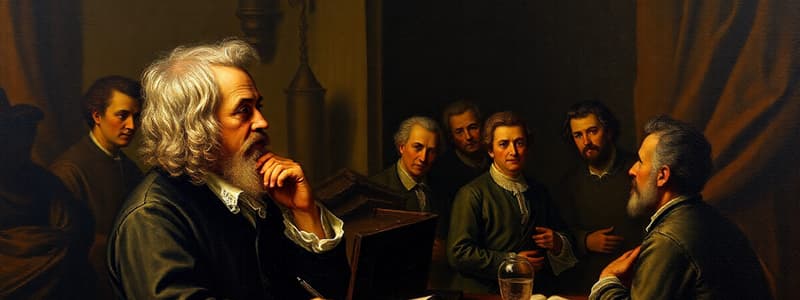Podcast
Questions and Answers
What is the central theme of Thomas Hobbes's Leviathan?
What is the central theme of Thomas Hobbes's Leviathan?
- The theory of absolute and unlimited sovereignty (correct)
- The justification for civil disobedience
- The impact of the scientific revolution on politics
- The theory of limited government
Which thinker’s ideas significantly influenced Hobbes's theory of state sovereignty?
Which thinker’s ideas significantly influenced Hobbes's theory of state sovereignty?
- John Locke
- Jean Bodin (correct)
- Montesquieu
- Thomas Jefferson
What event prompted Hobbes to develop his concept of state absolutism?
What event prompted Hobbes to develop his concept of state absolutism?
- The English Civil War (correct)
- The American Revolution
- The Industrial Revolution
- The French Revolution
Which around the time of Hobbes's political thought replaced the Aristotelian methodology?
Which around the time of Hobbes's political thought replaced the Aristotelian methodology?
What aspect of education did Hobbes particularly admire and apply to his philosophical work?
What aspect of education did Hobbes particularly admire and apply to his philosophical work?
In what year was Hobbes's Leviathan published?
In what year was Hobbes's Leviathan published?
Which group did Hobbes join during his exile in France?
Which group did Hobbes join during his exile in France?
What educational institution did Hobbes attend?
What educational institution did Hobbes attend?
Which statement best describes Hobbes's views on human nature?
Which statement best describes Hobbes's views on human nature?
What is a significant contribution of Hobbes to Western political thought?
What is a significant contribution of Hobbes to Western political thought?
What is the role of the sovereign in Hobbes's social contract theory?
What is the role of the sovereign in Hobbes's social contract theory?
Which of the following statements is true regarding Hobbes's views on sovereignty?
Which of the following statements is true regarding Hobbes's views on sovereignty?
How many laws of nature did Hobbes describe that serve as foundations of civil society?
How many laws of nature did Hobbes describe that serve as foundations of civil society?
What does Hobbes assert about the binding nature of the laws of nature?
What does Hobbes assert about the binding nature of the laws of nature?
What method did Hobbes believe should be used to understand politics?
What method did Hobbes believe should be used to understand politics?
During his travels, what philosophical concept did Hobbes develop?
During his travels, what philosophical concept did Hobbes develop?
Study Notes
Thomas Hobbes
- Considered one of the most influential figures in Western political thought
- One of the first to bridge political theory with a modern system of thought
- Established scientific foundations for absolutism and secularism
- Developed theory of state sovereignty expanding on Jean Bodin's ideas
- His major work, Leviathan, outlines the theory of absolute and unlimited sovereignty
- Believed that human nature is inherently selfish and competitive
- Argued that self-preservation is the primary motivation for human action
- Saw the solution to human conflict in the establishment of a strong and sovereign state
- Created a theory of 19 laws of nature that are based on reason and logic
- Believed that individuals should renounce their right to everything and accept limits on their freedoms
- Believed that the state is created by a social contract among individuals
- In the social contract, individuals agree to surrender their natural rights to the sovereign in exchange for security
- The sovereign, not a party to the contract, does not have to concede any rights to the people
- The sovereign power is absolute and unlimited and is not bound by the laws of nature or the law of God
The Life and Times of Hobbes
- Born in 1588 in Malmesbury, England, and died in 1679
- Lived through a turbulent time in English history known as the English Revolution
Hobbes’s Leviathan
- Published in 1651 - considered his most important work
- His views in Leviathan were unpopular with royalists and revolutionaries
- Despite this, Hobbes was anxious to exert influence in favor of the king.
Hobbes and Science
- Believed that politics should be supported by a scientific method based on mathematics
- Argued that all phenomena in the natural and social worlds could be explained in terms of matter in motion
- A proponent of mechanical materialism
- During his travels across Europe, he embraced the ideas of mechanical materialism
Hobbes and Education
- The son of a vicar with a thorough knowledge of the Scripture
- Found religion uninspiring
- Educated at Malmesbury and Oxford, graduating at the age of nineteen
- Became a tutor to the heir of William Cavendish, a relationship that continued for most of his life
- Traveled across Europe with his student, engaging with prominent thinkers of his time, including Bacon, Johnson, Descartes, and Galileo
- His exposure to rigorous methods of proof used in Geometry, influenced his approach to philosophy, politics, and psychology
- Led him to become a member of the "new philosophy" intellectual movement
Hobbes and the English Civil War
- Fled England to France during the Civil War seeking refuge for eleven years
- Joined the royalist group that had gathered around the exiled King Charles II.
Studying That Suits You
Use AI to generate personalized quizzes and flashcards to suit your learning preferences.
Related Documents
Description
Explore the profound ideas of Thomas Hobbes, a pivotal figure in Western political thought. This quiz delves into his theories of absolutism, state sovereignty, and the social contract as outlined in his seminal work, Leviathan. Understand Hobbes' views on human nature and the necessity of a strong sovereign state.



